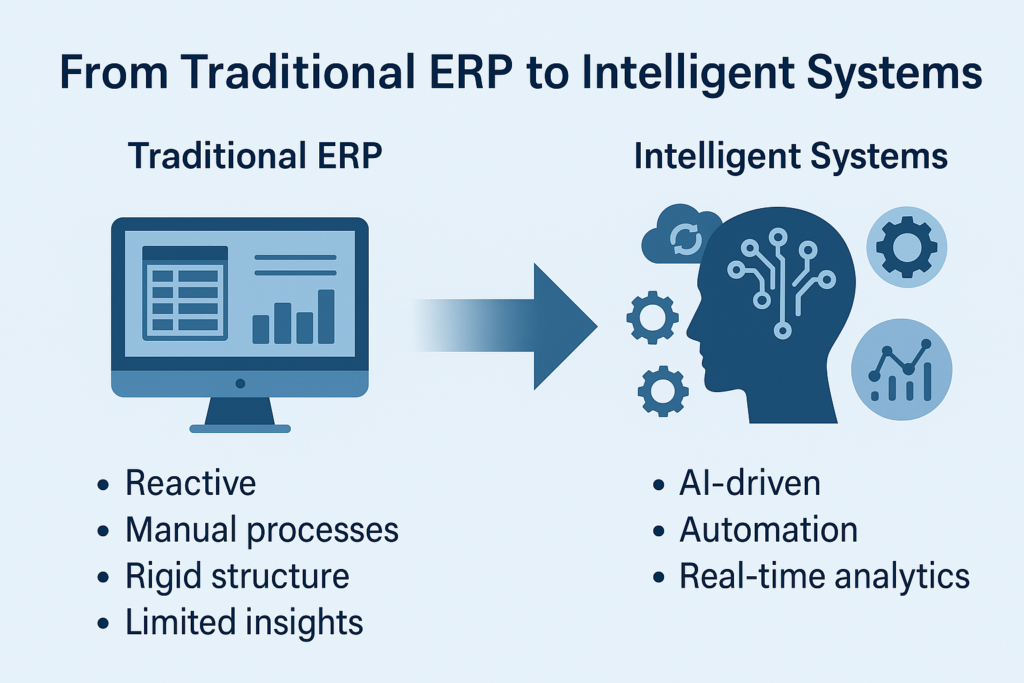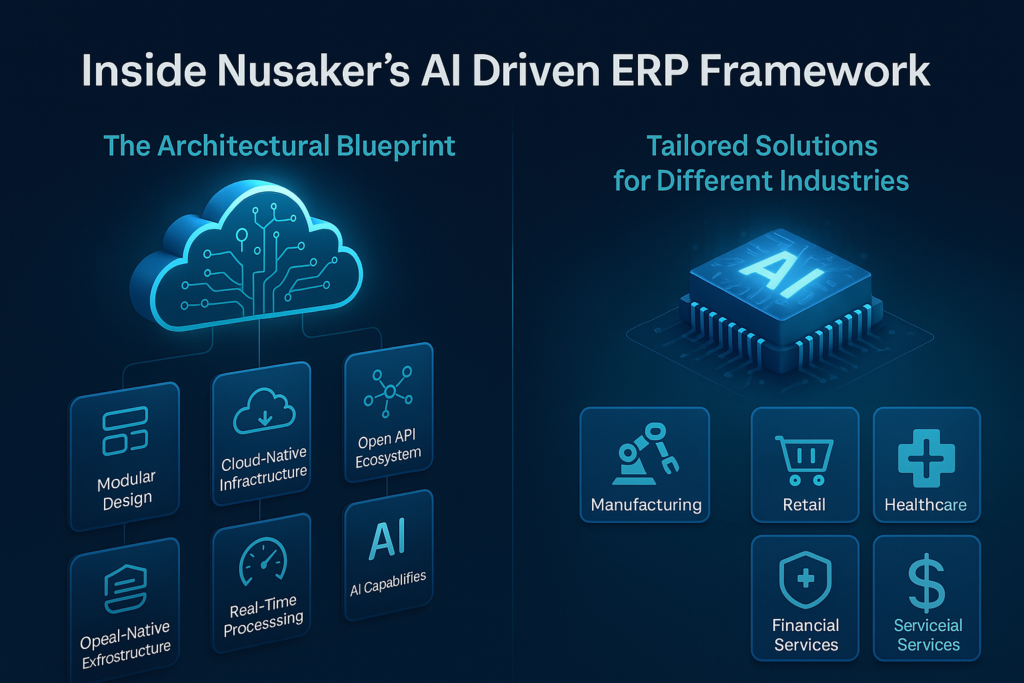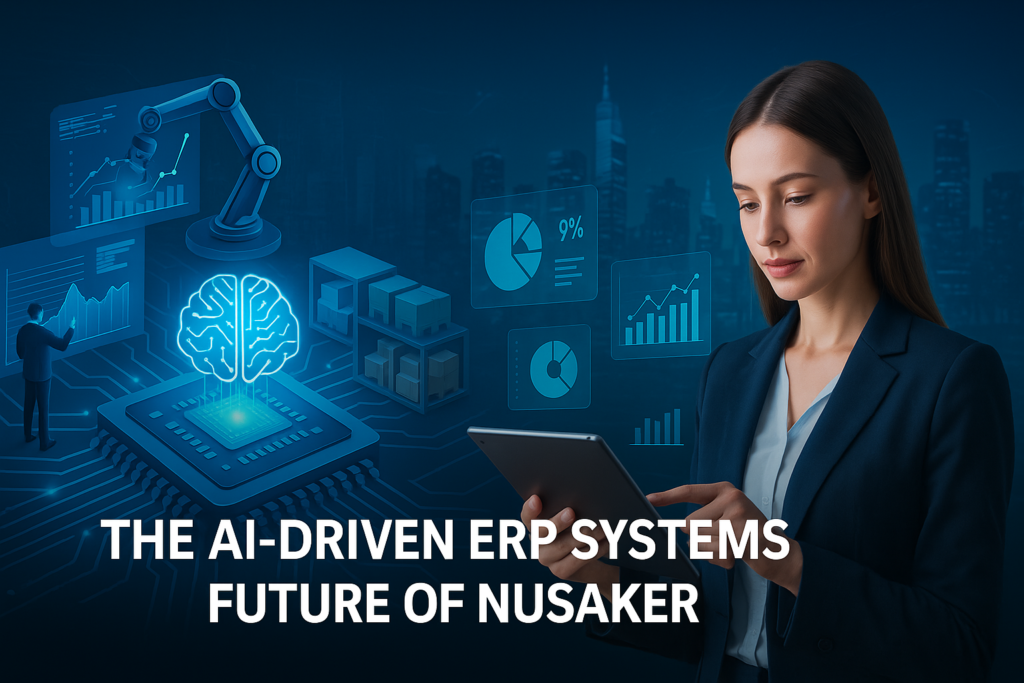ERP systems have traditionally served as the backbone of business operations, unifying key functions into a single cohesive system. But the game is changing. Traditional ERPs, often rigid and reactive, are giving way to smarter, more dynamic platforms powered by Artificial Intelligence. This isn’t just an upgrade; it’s a revolution. Standing prominently in this transformation is Nusaker, a business technology innovator pioneering the next generation of enterprise management. Understanding the ai driven ERP systems future of nusaker isn’t just about tracking a company; it’s about understanding the trajectory of modern business itself.
This article dives deep into how AI is reshaping ERP, specifically through the lens of Nusaker’s advanced solutions. We’ll explore the journey from legacy systems to intelligent platforms, dissect Nusaker’s specific framework, examine real-world results, address common challenges, and look toward what’s next. If you’re wondering how businesses can gain a true competitive edge through technology, the ai driven ERP systems future of nusaker provides compelling answers.
Table of Contents
Understanding Nusaker’s Role in AI ERP
To grasp the future, we first need to understand the key players shaping it. Nusaker isn’t just another tech company; it’s a specialist carving a niche in a rapidly evolving field.
Who is Nusaker
Nusaker is a leading innovator specifically focused on developing and implementing AI-driven ERP solutions. Think of them as architects of intelligent business operations. Their expertise lies in building comprehensive enterprise management systems that don’t just automate tasks but actively learn and provide insights to drive growth. Their client base is diverse, spanning crucial sectors like manufacturing, retail, healthcare, and financial services, demonstrating the wide applicability of their tailored, AI-powered approach. Notably, their successful implementations in manufacturing signal a significant shift from old-school management to smart, data-centric operations.
Nusaker’s Approach to Digital Transformation
Nusaker views artificial intelligence not merely as a tool but as the fundamental catalyst for true digital transformation. Their philosophy isn’t just about incremental improvements; it’s about enabling businesses to completely reimagine how they operate. By weaving technologies like machine learning, natural language processing (NLP), and predictive analytics into a cohesive ERP framework, they create systems that function as both reliable operational backbones and intelligent advisors. This strategic integration positions Nusaker at the vanguard, helping organizations transition from outdated legacy systems to AI platforms that deliver clear, measurable competitive advantages.
From Traditional ERP to Intelligent Systems

The evolution of ERP hasn’t happened overnight. Understanding this progression highlights why the move towards AI is so significant.
Limitations of Yesterday’s ERP
Traditional ERP systems, while groundbreaking in their time for centralizing data, carried inherent weaknesses. They were primarily reactive, recording history rather than predicting the future. Many processes demanded significant manual intervention, breeding inefficiency, and errors. Their rigid structures struggled to adapt to the fast pace of modern business. Furthermore, they collected vast seas of data but lacked the sophisticated tools to turn that data into actionable insights. Finally, often complex and unintuitive user interfaces hindered widespread adoption. These limitations have become increasingly untenable in today’s competitive landscape.
The Rise of AI Integration
The path to today’s AI-driven systems involved several key phases: initial basic automation in the 2000s, the critical shift to cloud migration (roughly 2010-2015) improving accessibility, the incorporation of basic analytics (2015-2020) for better reporting, and finally, the current phase of full AI transformation (2020-Present). This journey has fundamentally shifted ERP from being passive data vaults to intelligent, proactive partners capable of learning, anticipating, and optimizing business decisions.
Core AI Technologies Powering Nusaker’s ERP
What makes an ERP “AI-driven”? It’s the integration of several powerful technologies working in synergy. Nusaker leverages a suite of these to deliver advanced capabilities.
Key AI Components
Nusaker’s systems intelligently weave together core AI technologies:
- Machine Learning (ML): Algorithms that detect patterns in data, enabling systems to learn and improve predictions over time without explicit programming.
- Natural Language Processing (NLP): Allows systems to understand and interact using human language, enabling features like chatbots and text analysis.
- Predictive Analytics: Uses statistical techniques and ML to forecast future trends, anticipate needs, and recommend optimal actions.
- Computer Vision: Enables systems to “see” and interpret images, useful for document scanning, quality control, and inventory checks.
- Intelligent Process Automation (IPA): Goes beyond simple automation; AI enhances workflows, allowing them to adapt dynamically to changing conditions.
Transformative Capabilities Unlocked
The fusion of these AI technologies introduces game-changing capabilities into the ERP landscape:
- Automated Data Processing: Reducing manual entry by intelligently extracting and validating data.
- Predictive Intelligence: Forecasting market shifts, maintenance needs, and resource demands proactively.
- Conversational Interfaces: Making systems more accessible through NLP-powered chatbots and virtual assistants.
- Anomaly Detection: Identifying unusual patterns in data that could signal risks or opportunities.
- Cognitive Process Automation: Creating workflows that learn and self-optimize for peak efficiency.
- Personalization: Tailoring user experiences and information delivery based on individual roles and behavior.
These features collectively foster a more intelligent, agile, and efficient approach to managing enterprise resources.
Inside Nusaker’s AI Driven ERP Framework

Nusaker’s approach isn’t just about adding AI features; it’s about building an architecture designed for intelligence from the ground up.
The Architectural Blueprint
Nusaker’s platform is built on a modern, cloud-based architecture designed for flexibility and power. Key characteristics include a modular design (clients pick the functions they need), cloud-native infrastructure (scalable and accessible), an open API ecosystem (for easy integration), a real-time processing engine (for instant insights), and deeply embedded AI capabilities throughout the system, not just bolted on. This architecture ensures reliability combined with cutting-edge AI performance.
Tailored Solutions for Different Industries
Recognizing that one size doesn’t fit all, Nusaker develops industry-specific AI-ERP solutions. Whether it’s optimizing production schedules and predictive maintenance in manufacturing, analyzing customer behavior and managing inventory in retail, handling patient management and compliance in healthcare, or assessing risk and detecting fraud in financial services, Nusaker provides tailored tools that address unique sector challenges. This focus ensures relevance and maximizes value for clients exploring the ai driven ERP systems future of Nusaker.
Real World Impact Nusaker’s Success Stories
The true measure of any technology lies in its real-world application and results. Nusaker’s implementations provide compelling evidence of the value AI-driven ERP delivers.
Manufacturing Transformation Case
Consider a large industrial enterprise struggling with inefficient legacy systems and high IT costs. Nusaker implemented its cloud-based AI-ERP platform, integrating IoT sensors and deploying predictive maintenance, quality control, and supply chain modules. The results were dramatic: a 40% reduction in overall operating costs, a 65% drop in equipment failures thanks to predictive maintenance, a 35% decrease in inventory holding costs via better forecasting, and $2.3 million in annual savings from waste reduction. This showcases a profound digital transformation enabled by Nusaker’s technology.
Retail Inventory Optimization Case
A retail chain faced chronic inventory issues – stockouts of popular items alongside excess slow-moving products. Nusaker deployed AI-powered demand forecasting, integrated POS data, enabled dynamic pricing, and rolled out personalized marketing. This led to a 25% increase in sales through better product availability and targeted recommendations, alongside reduced inventory costs. It highlights how AI-ERP can directly impact customer-facing results.
Financial Services Fraud Detection Case
A financial firm grappling with rising fraud and complex regulations adopted Nusaker’s platform. Using AI-powered anomaly detection for transactions, automated compliance checks, and risk assessment analytics, the firm prevented $2 million in fraud losses in the first year alone, while significantly reducing the administrative burden of compliance and improving reporting efficiency.
The Tangible Benefits of Nusaker’s AI ERP
The case studies hint at the broader value proposition. Implementing AI-driven ERP systems like Nusaker’s translates into concrete business advantages.
Boosting Operational Efficiency
Automation is a key benefit. Smart document processing, intelligent workflows, and RPA handle repetitive tasks, freeing up human potential. AI optimizes resource allocation (human, financial, physical) and significantly reduces errors common in manual processes. Clients implementing Nusaker’s solutions report substantial efficiency gains, contributing to operational cost reductions of up to 40%.
Sharpening Strategic Decision Making
AI transforms data from a passive asset into active intelligence. Predictive capabilities allow businesses to anticipate market shifts and operational needs. Scenario modeling helps evaluate the potential outcomes of different decisions. This data-driven approach, supported by real-time dashboards and anomaly detection, enables faster, more informed, and ultimately better strategic choices.
Achieving Significant Cost Savings and ROI
The financial benefits are clear and measurable. Reduced operational costs, lower inventory expenses (like the documented 35% reduction), decreased maintenance spending (thanks to predictive approaches), and savings from error prevention and waste reduction (like the $2.3 million annual figure) all contribute to a strong return on investment. Organizations typically see ROI within 12-18 months of implementing Nusaker’s AI-ERP.
Gaining a Competitive Edge
Beyond cost and efficiency, AI-driven ERP provides strategic differentiation. Businesses become more responsive to market changes, better equipped to innovate, capable of delivering superior customer experiences through personalization and proactive service, and gain overall operational agility to pivot quickly when needed. These advantages are crucial for long-term success.
Navigating the Challenges of AI ERP Implementation
While the benefits are compelling, adopting AI-driven ERP systems isn’t without hurdles. Awareness and planning are key to overcoming them.
The Critical Role of Data Quality
AI is data-hungry, and its output is only as good as its input. Many organizations face challenges with inconsistent, incomplete, or siloed data. Successful implementation requires a dedicated effort towards data cleaning, integration, and establishing robust governance policies. Nusaker incorporates data assessment and remediation into its methodology.
Managing Change and Driving User Adoption
Technology is only effective if people use it. Resistance to change, potential skill gaps in leveraging AI tools, the need to redesign ingrained processes, and fostering a data-driven culture are significant human-centric challenges. Comprehensive change management, including training and clear communication, is vital.
Addressing Security and Privacy Concerns
Handling vast amounts of sensitive business and customer data requires stringent security measures. Algorithm transparency (“black box” problem) can complicate governance, and compliance with regulations like GDPR is non-negotiable. Ethical considerations regarding bias must also be addressed. Nusaker emphasizes robust security frameworks and privacy-by-design principles.
Overcoming Implementation Complexity
Integrating new AI-ERP systems, especially with legacy infrastructure, can be technically complex. These projects demand significant time, financial investment, and expertise. Customization is often needed for specific industry requirements. A phased, iterative implementation approach helps manage this complexity.
Market Dynamics and the Future Outlook for AI ERP
The landscape for AI-driven ERP is dynamic and rapidly evolving, pointing towards an exciting future.
The Current AI ERP Market Scene
Adoption is accelerating – surveys indicate 82% of manufacturers plan to boost AI budgets for ERP in 2025. Major vendors are in a fierce race to embed AI, leading to rapid innovation. Specialization, like Nusaker’s industry focus, is a growing trend. Cloud-based solutions are overwhelmingly becoming the standard. Understanding this context is key to appreciating the ai driven ERP systems future of Nusaker.
Exciting Technologies on the Horizon
The next wave of innovation is already visible. Agentic AI promises autonomous agents managing entire workflows. Enhanced NLP will lead to even more sophisticated conversational interactions. Hyperautomation will combine multiple AI tools to automate increasingly complex decisions. Extended Reality (XR) integration offers new ways to visualize data, and Blockchain could enhance security and traceability. Nusaker is actively researching areas like agentic AI and hyperautomation.
What to Expect Beyond 2025
Looking further ahead (2025-2030), we anticipate trends like autonomous operations where ERP systems manage themselves with minimal oversight, deeper ecosystem integration connecting businesses with partners and suppliers seamlessly, a greater sustainability focus within ERP tracking environmental and social metrics, democratized AI enabling non-technical users, and truly cognitive ERP systems that understand context and implications. Nusaker’s roadmap aligns with these long-term shifts.
Answering Your Questions About AI Driven ERP Systems
Prospective adopters often have similar questions about embarking on this journey.
Common Implementation Queries
- Timeline? Varies by scope, but typically 6-12 months for smaller projects, 12-24+ months for enterprise-wide deployments.
- ROI? Nusaker clients often see ROI in 12-18 months, driven by significant cost reductions (e.g., 40% ops cost, 35% inventory cost) and productivity gains.
- Cost? While an investment, the total cost of ownership can be lower than traditional ERP due to savings. Nusaker offers flexible pricing.
Key Technical Questions
- Security/Privacy? Nusaker employs multi-layered security (encryption, access controls, audits) and adheres to regulations like GDPR/CCPA.
- Enhance Existing Systems? Yes, Nusaker can enhance existing ERPs with AI or provide full replacements, depending on the situation.
- Core Technologies? Primarily ML, NLP, Predictive Analytics, Computer Vision, and Intelligent Process Automation.
Addressing Strategic Concerns
- Job Impact? AI typically shifts roles towards higher-value tasks (analysis, strategy) rather than eliminating jobs. New roles often emerge.
- Best Industries? Manufacturing, retail, healthcare, and financial services see major benefits currently, but advantages exist across sectors. Nusaker offers industry specializations.
- Future Evolution (Next 5 Years)? Expect more autonomy (agentic AI), better NLP, IoT/Blockchain integration, and a focus on sustainability.
Recommendations for Businesses Considering AI ERP
Embarking on the AI-ERP journey requires careful planning and execution.
Planning Your Strategic Move
Start with a thorough assessment of your current state (processes, systems, data). Define clear, measurable objectives aligned with your business strategy. Prioritize use cases that offer the highest value. Develop a realistic, phased implementation approach. Crucially, establish a robust governance framework from the outset.
Best Practices for Smooth Implementation
Focus heavily on data readiness – cleaning, integration, and governance are prerequisites. Invest significantly in change management – training, communication, and support are essential. Don’t just automate old ways; optimize processes to leverage AI’s potential. Use an iterative approach, implementing incrementally and learning along the way. Assemble cross-functional teams involving both business and IT stakeholders.
Choosing the Right Partner Like Nusaker
When evaluating vendors, consider their industry expertise – do they understand your specific challenges? Assess the maturity and effectiveness of their AI capabilities. Evaluate integration capabilities with your existing ecosystem. Ensure the platform is scalable for future growth. Finally, examine their approach to support, training, and ongoing assistance.
Conclusion The Undeniable AI Driven ERP Systems Future of Nusaker
Artificial intelligence is not just enhancing ERP systems; it is fundamentally redefining them. Nusaker is demonstrably at the forefront of this transformation, creating intelligent platforms that drive real-world results. The documented successes – 40% operational cost reductions, 65% fewer equipment failures, and multi-million dollar annual savings – underscore the tangible power of their AI-integrated approach.
While challenges related to data, change management, and complexity are real, they are navigable with strategic planning and execution. Businesses that successfully adopt these technologies position themselves for substantial and sustainable competitive advantages. The ai driven ERP systems future of nusaker is intrinsically linked to the broader future of intelligent enterprise management.
Looking ahead, technologies like agentic AI and hyper-automation promise even greater capabilities, further solidifying the trend toward autonomous, predictive, and deeply integrated business operations. For organizations aiming to thrive in the coming years, strategically embracing AI-driven ERP isn’t just an option; it’s becoming an imperative. Partnering with experienced innovators like Nusaker can pave the way for a more efficient, intelligent, and competitive future.

